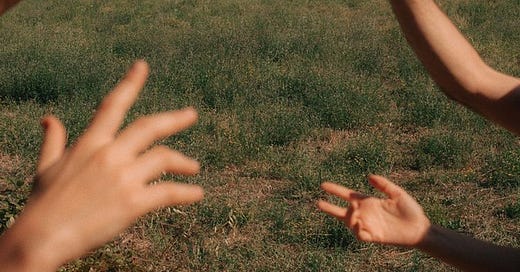I’ve had my share of friendship fallouts over the years. They’ve left me feeling heart broken, a mess, jaded. After an unexpected one that occurred more recently, I went through the habitual cycle of shaming myself for it’s ending. Or rather, the slow, sad, and incredibly confusing fade of it. I placed all the blame on myself, dismissing the fact that friendship involves two people’s willingness to participate, communicate, and put in the work in order to grow and become better people for one another.
I’m aware that my mental health challenges of anxiety, depression, and OCD don’t make me the easiest person to be friends with. I’m high maintenance in particular ways. A friend once described my temperament as mercurial. And as offended as I was at the time, we laugh about it together now because of how true it was, sometimes still is, when I haven’t practiced working on managing it.
While I know that I can be “a lot” at times, I also know that when I’m in a state of equilibrium (or at times even when I’m not), I’m a giver, a lover, a compassionate listener; someone who will give my friends grace, time, my whole heart, and a safe place to land. Since I know what it’s like to feel like “a lot,” I’ve learned how to love the hell out of other people who are “a lot.” And over time I’ve discovered that this being “a lot” actually isn’t a lot at all. It just is. We are all distinct individuals with diverse attachment styles, needs, and past experiences, who are all just yearning to be loved and understood.
“Because I know what it’s like to feel like ‘a lot,’ I’ve learned how to love the hell out of other people who are ‘a lot.’ And over time I’ve discovered that this being ‘a lot’ actually isn’t a lot at all. It just is.”
Getting to this point of wholeheartedly loving myself and others has required a tremendous amount of effort. I had to unlearn my conditioned belief that love is transactional and conditional, that I had to meet a checklist of prerequisites to be deemed worthy of love. I had to confront the parts of myself that never felt like enough and learn to love them again. This journey involved initiating difficult conversations, repeatedly exposing my less attractive traits, such as expressing when I felt hurt, annoyed, or offended, and being vulnerable enough to reveal my truth, no matter how uncomfortable. In addition, I had to own up to my mistakes and apologize sincerely. This meant being open-minded enough to see the situation from another's perspective and listen with an open heart. Only then could two parties have a courageous conversation and come to an understanding.
The notion that friendship should always be effortless is a lie. I’m not suggesting that we should drain ourselves by trying to sustain relationships that no longer bring us joy. Rather, what I’m saying is that in order to cultivate the profound connections and closeness we yearn for, we must be willing to invest the effort. This means letting go of our tendencies to people-please, ghost, or hide our genuine feelings.
Last month, I took some time to look back on my previous friendships and how they had affected me. It was exhausting to constantly overthink and second-guess myself, and I often found myself lost in my own thoughts. I felt like I had to over correct for every mistake I had made in the past, which left me feeling drained and depleted.



